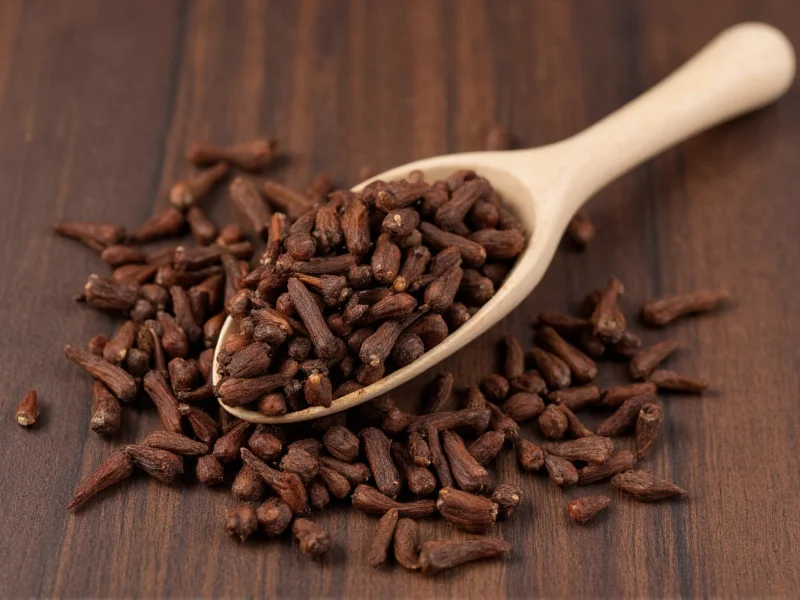Cloves offer one of the most distinctive flavor profiles in the spice world. These small, nail-shaped dried flower buds from the Syzygium aromaticum tree deliver an intense sensory experience that's immediately recognizable once encountered. The dominant compound eugenol (making up 70-90% of clove essential oil) creates that signature warming sensation that seems to radiate from your tongue throughout your mouth.
When you bite into a whole clove, the initial taste sensation is surprisingly sweet with floral undertones, quickly followed by intense warmth that borders on heat without actual spiciness. This warming quality differs from chili heat—it's more of a spreading warmth that can temporarily numb the area around your mouth. The aftertaste reveals subtle bitterness and earthiness that balances the initial sweetness.
The flavor complexity of cloves becomes particularly evident when comparing different forms. Whole cloves maintain their essential oils better, offering a cleaner, more focused flavor profile. Ground cloves, while convenient, lose potency faster and can develop slightly musty notes if not fresh. Properly stored whole cloves retain their vibrant flavor for up to two years, while ground cloves begin losing potency within six months.
| Spice | Primary Flavor Notes | Heat Level | Best Culinary Applications |
|---|---|---|---|
| Cloves | Warm, spicy, sweet, floral, slightly bitter | Moderate numbing warmth | Ham glazes, mulled wines, spice blends, baked goods |
| Cinnamon | Sweet, woody, warm | Mild warmth | Oatmeal, coffee, desserts, curries |
| Allspice | Complex blend resembling cinnamon, nutmeg, cloves | Mild warmth | Jamaican jerk seasoning, stews, pickling |
| Nutmeg | Warm, nutty, slightly sweet | Very mild warmth | Custards, mashed potatoes, béchamel sauces |
The chemical composition of cloves explains much about their unique taste experience. Beyond eugenol, cloves contain beta-caryophyllene (contributing earthy notes), eugenol acetate (adding floral elements), and smaller amounts of other compounds that create their multidimensional flavor. This complex chemistry makes cloves particularly interesting in molecular gastronomy, where chefs manipulate these compounds to create novel taste experiences.
Culinary professionals understand that cloves' potent flavor requires careful handling. The general rule is less is more—typically one whole clove per pound of meat or two cups of liquid provides sufficient flavor without overwhelming other ingredients. When using ground cloves, reduce the amount by half since grinding releases more flavor compounds. For best results, add whole cloves early in slow-cooked dishes to allow gradual flavor infusion, while adding ground cloves near the end of cooking preserves their volatile compounds.
The taste of cloves transforms significantly when heated. Raw cloves deliver their most intense numbing sensation, while cooking mellows the sharp edges and integrates the flavor more smoothly with other ingredients. In baking, cloves combine beautifully with citrus zest, which helps balance their intensity. In savory applications, they pair exceptionally well with onions, garlic, and acidic ingredients like tomatoes or vinegar that help cut through the richness.
Understanding what do cloves taste like helps explain their historical value. Before modern preservation methods, cloves' antimicrobial properties made them essential for food safety, while their distinctive flavor profile helped mask the taste of less-than-fresh ingredients. Today, we appreciate cloves primarily for their unique contribution to global cuisines—from the garam masala of India to the speculaas spice blend of the Netherlands.
When evaluating clove quality, fresh cloves should have a strong, penetrating aroma and feel heavy for their size (indicating high essential oil content). Dull-colored cloves or those that feel light typically have lost significant flavor compounds. Proper storage in airtight containers away from light preserves the volatile oils responsible for cloves' characteristic taste.
What do cloves taste like compared to cinnamon?
Cloves have a more intense, numbing warmth compared to cinnamon's sweeter, woodier profile. While cinnamon offers gentle warmth, cloves deliver a pronounced spicy heat that can temporarily numb the mouth. Cinnamon tastes primarily sweet with subtle spice notes, whereas cloves present a complex blend of sweet, spicy, floral, and slightly bitter elements.
Why do cloves make your mouth feel numb?
The numbing sensation comes from eugenol, which makes up 70-90% of clove essential oil. Eugenol interacts with pain receptors in the mouth, creating a temporary numbing effect similar to dental anesthetics. This property made cloves historically valuable for toothache relief and explains why excessive use can overwhelm other flavors in cooking.
Are cloves sweet or bitter?
Cloves contain both sweet and bitter elements in their flavor profile. The initial taste registers as surprisingly sweet with floral notes, but this quickly gives way to warm spiciness followed by subtle bitterness in the aftertaste. This complex interplay of sweet, spicy, and bitter notes creates their distinctive character that's difficult to categorize simply as sweet or bitter.
How much clove should I use in recipes?
Due to their potent flavor, use cloves sparingly. For most dishes, one whole clove per pound of meat or two cups of liquid provides sufficient flavor. When using ground cloves, reduce the amount by half since grinding releases more flavor compounds. Remember that cloves' flavor intensifies with cooking time, so add them early in slow-cooked dishes but near the end for quick preparations.
Does the taste of cloves change when cooked?
Yes, cooking significantly transforms clove flavor. Raw cloves deliver their most intense numbing sensation and sharper edges. When heated, the volatile compounds mellow, creating a smoother, more integrated flavor that blends better with other ingredients. In baking, the sweetness becomes more pronounced, while in savory dishes, the earthy notes emerge more clearly. Prolonged cooking can cause cloves to develop slightly bitter notes if used in excess.











 浙公网安备
33010002000092号
浙公网安备
33010002000092号 浙B2-20120091-4
浙B2-20120091-4